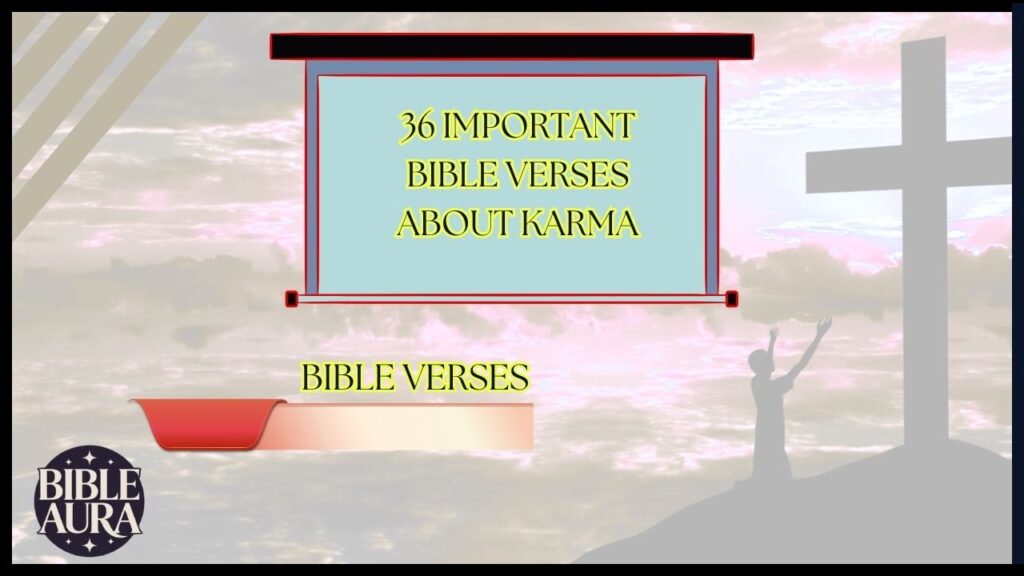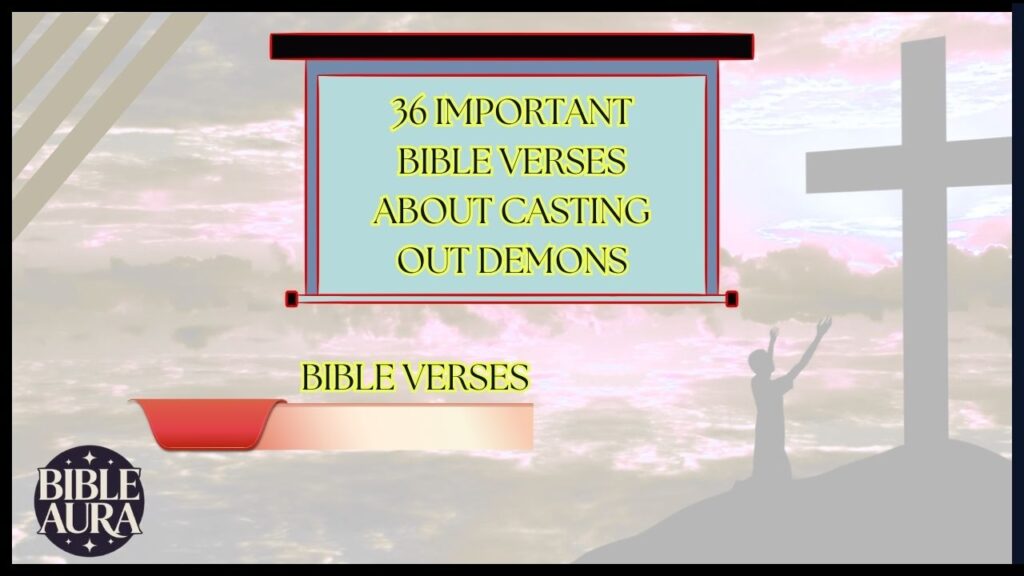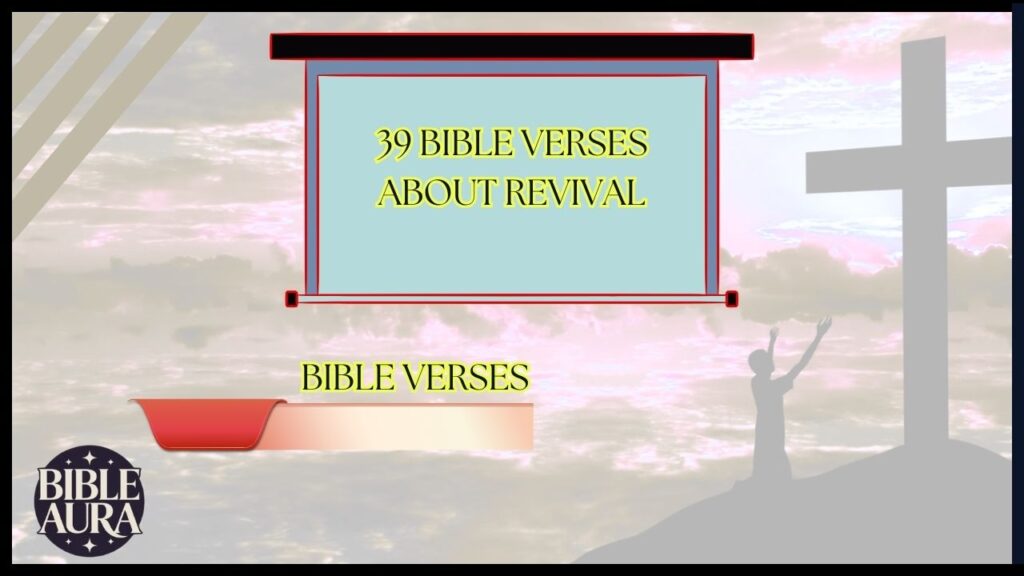Bible Verses About Karma: Many Christians wonder about the concept of karma and how it relates to biblical teachings. While “karma” itself is not a biblical term, the principle that actions have consequences is thoroughly woven throughout Scripture.
The Bible consistently teaches that God has established a moral order where choices lead to outcomes, though this differs significantly from the Eastern religious concept of karma.
The biblical perspective focuses on God’s sovereignty, justice, and grace rather than an impersonal cosmic force. Scripture teaches that while we do reap what we sow, God’s mercy and forgiveness through Christ can break negative cycles and offer redemption that transcends our past actions.
These 36 verses illuminate how God’s Word addresses the principle of consequences while revealing a path of grace that goes beyond simple cause and effect.
Also Read : 39 Important Bible Verses About Long Life
God’s Justice and Reaping What You Sow
1. Galatians 6:7-8
“Do not be deceived: God cannot be mocked. A man reaps what he sows. Whoever sows to please their flesh, from the flesh will reap destruction; whoever sows to please the Spirit, from the Spirit will reap eternal life.”

This verse directly addresses the principle that our actions have consequences. Paul reminds us that life operates according to spiritual laws established by God. When we make choices that align with God’s will, we experience spiritual blessings, while self-centered choices lead to negative outcomes.
2. Job 4:8
“As I have observed, those who plow evil and those who sow trouble reap it.”
Job’s friend Eliphaz observes the pattern that those who deliberately engage in wrongdoing eventually face the consequences of their actions. This highlights God’s moral order where injustice doesn’t ultimately prosper. Consider examining your own patterns of behavior to ensure you’re not creating future hardships through present choices.
3. Proverbs 22:8
“Whoever sows injustice reaps calamity, and the rod they wield in fury will be broken.”
Solomon warns that unjust actions lead to eventual downfall. Those who mistreat others will not enjoy lasting success, as God’s justice ultimately prevails. Apply this by committing to fairness and compassion in all dealings, knowing that integrity leads to lasting stability.
4. Hosea 8:7
“They sow the wind and reap the whirlwind. The stalk has no head; it will produce no flour. Were it to yield grain, foreigners would swallow it up.”
This powerful metaphor illustrates how small acts of disobedience can lead to exponentially larger consequences. Israel’s unfaithfulness produced increasingly severe outcomes. When we compromise with sin, the results often exceed what we anticipated. Practice examining potential long-term consequences before making decisions.
5. Hosea 10:12
“Sow righteousness for yourselves, reap the fruit of unfailing love, and break up your unplowed ground; for it is time to seek the LORD, until he comes and showers his righteousness on you.”
Hosea provides the positive counterpart to the previous warning. When we cultivate righteousness in our lives, we experience God’s love as the natural result. This verse encourages actively pursuing righteousness through seeking God. Make seeking God a daily priority, knowing His goodness follows faithful pursuit.
6. Proverbs 11:18
“A wicked person earns deceptive wages, but the one who sows righteousness reaps a sure reward.”
This proverb contrasts the temporary, unsatisfying gains of wickedness with the reliable rewards of righteousness. While evil may appear profitable initially, only righteous living produces lasting benefit. Evaluate your goals based on eternal rather than temporary values.
Also Read: 37 Important Bible Verses About Discipline
Divine Judgment and Consequences
7. Romans 2:6-8
“God ‘will repay each person according to what they have done.’ To those who by persistence in doing good seek glory, honor and immortality, he will give eternal life. But for those who are self-seeking and who reject the truth and follow evil, there will be wrath and anger.”
Paul explains that God’s judgment perfectly matches each person’s actions and heart orientation. Unlike impersonal karma, God’s judgment is personal, fair, and considers our motives. Live with awareness that God sees beyond appearances to the true intent behind your actions.
8. Colossians 3:25
“Anyone who does wrong will be repaid for their wrongs, and there is no favoritism.”
Paul reminds believers that God’s justice applies universally, regardless of status or position. No one is exempt from accountability for wrongdoing. Take comfort in God’s fairness while also accepting that your own actions, good or bad, matter significantly.
9. 2 Corinthians 5:10
“For we must all appear before the judgment seat of Christ, so that each of us may receive what is due us for the things done while in the body, whether good or bad.”

Paul teaches that all believers will give an account of their lives to Christ. This accountability should motivate godly living, knowing our choices have eternal significance. Live each day with the awareness that your actions are building an eternal legacy.
10. Revelation 20:12
“And I saw the dead, great and small, standing before the throne, and books were opened. Another book was opened, which is the book of life. The dead were judged according to what they had done as recorded in the books.”
John’s vision reveals that God keeps a perfect record of human actions that will factor into final judgment. Unlike karma’s impersonal accounting, God personally evaluates with perfect knowledge and mercy. Let this reality inspire both reverence for God and intentionality in your choices.
11. Ecclesiastes 12:14
“For God will bring every deed into judgment, including every hidden thing, whether it is good or evil.”
Solomon concludes that nothing escapes God’s notice every action, even those hidden from others, will be evaluated by God. This universal accountability should encourage integrity even when no one else is watching. Practice living transparently before God, knowing nothing remains concealed.
12. Matthew 16:27
“For the Son of Man is going to come in his Father’s glory with his angels, and then he will reward each person according to what they have done.”
Jesus himself confirms that when he returns, he will bring appropriate rewards based on each person’s actions. This divine accountability extends to both believers and unbelievers. Let Christ’s promised return motivate faithful service and righteous living today.
Grace Transcending Karma
13. Romans 5:8
“But God demonstrates his own love for us in this: While we were still sinners, Christ died for us.”
Unlike karma’s rigid cause-effect relationship, God offers grace that transcends our negative actions. Christ died for us while we were still caught in sin, offering forgiveness we don’t deserve. Accept God’s grace as the ultimate refutation of karma’s endless cycle of merit and demerit.
14. Ephesians 2:8-9
“For it is by grace you have been saved, through faith and this is not from yourselves, it is the gift of God not by works, so that no one can boast.”
Paul clarifies that salvation comes through God’s grace rather than our good works. This fundamentally contradicts karma’s system of earning spiritual advancement through actions. Embrace the freedom that comes from being saved by grace rather than by perfectly balancing your spiritual ledger.
15. Titus 3:5
“He saved us, not because of righteous things we had done, but because of his mercy. He saved us through the washing of rebirth and renewal by the Holy Spirit.”
Paul emphasizes that God’s mercy, not our righteous deeds, secures our salvation. This divine intervention breaks any karmic cycle of cause and effect through spiritual regeneration. Let God’s mercy inspire gratitude rather than feeling you must earn His favor through perfect performance.
16. Psalm 103:10-12
“He does not treat us as our sins deserve or repay us according to our iniquities. For as high as the heavens are above the earth, so great is his love for those who fear him; as far as the east is from the west, so far has he removed our transgressions from us.”

David celebrates God’s merciful response to our failures. Rather than giving us what we deserve (karma’s principle), God separates us from our sins through forgiveness. Meditate on the immeasurable distance of “east from west” to appreciate how completely God removes your sins.
17. Isaiah 43:25
“I, even I, am he who blots out your transgressions, for my own sake, and remembers your sins no more.”
God declares His commitment to forgive completely, even choosing to forget our sins. This divine amnesty transcends any system where past actions necessarily determine future outcomes. Trust in God’s promise to truly forgive and not hold your past against you.
18. Micah 7:18-19
“Who is a God like you, who pardons sin and forgives the transgression of the remnant of his inheritance? You do not stay angry forever but delight to show mercy. You will again have compassion on us; you will tread our sins underfoot and hurl all our iniquities into the depths of the sea.”
Micah marvels at God’s incomparable forgiveness that actively removes our sins from His sight. God’s delight in showing mercy stands in stark contrast to an impersonal system of karmic balance. Allow this beautiful imagery of sins hurled into the sea to remind you of God’s complete forgiveness.
Also Read: 45 Bible Verses About Gossip and Slander (Explained)
Personal Responsibility and Choices
19. Ezekiel 18:20
“The one who sins is the one who will die. The child will not share the guilt of the parent, nor will the parent share the guilt of the child. The righteousness of the righteous will be credited to them, and the wickedness of the wicked will be charged against them.”
Ezekiel establishes individual accountability before God, refuting both karma’s intergenerational effects and the idea that one person can suffer for another’s wrongdoing. Each person bears responsibility for their own actions. Take ownership of your choices while trusting God’s perfect justice.
20. Jeremiah 17:10
“I the LORD search the heart and examine the mind, to reward each person according to their conduct, according to what their deeds deserve.”
God evaluates not just outward actions but also inner motives when determining consequences. His perfect knowledge ensures truly fair judgment beyond surface appearances. Focus on cultivating genuine integrity rather than merely managing outward impressions.
21. 1 Samuel 26:23
“The LORD rewards everyone for their righteousness and faithfulness. The LORD delivered you into my hands today, but I would not lay a hand on the LORD’s anointed.”

David expresses confidence that God will properly reward righteous behavior, even when humans might fail to do so. This trust allowed him to refrain from taking revenge against Saul. Trust God to handle justice in situations where you’ve been wronged rather than seeking personal vengeance.
22. Proverbs 24:12
“If you say, ‘But we knew nothing about this,’ does not he who weighs the heart perceive it? Does not he who guards your life know it? Will he not repay everyone according to what they have done?”
Solomon reminds us that God sees beyond our excuses and rationalizations to our true knowledge and intentions. Pleading ignorance doesn’t exempt us from responsibility. Practice honest self-examination, acknowledging what you truly know and the real motivations behind your actions.
23. Psalm 62:12
“And with you, Lord, is unfailing love; and you reward everyone according to what they have done.”
David combines God’s love with His justice, showing they work together rather than opposing each other. God’s rewards flow from both justice and love, ensuring perfect outcomes. Rest in the confidence that God’s treatment of you balances both perfect love and perfect justice.
24. Proverbs 12:14
“From the fruit of their lips people are filled with good things, and the work of their hands brings them reward.”
This proverb highlights how our words and actions naturally produce corresponding results in our lives. What we say and do creates a harvest we will experience. Pay attention to both your speech patterns and work habits, knowing they are creating your future circumstances.
Also Read: 42 Powerful Bible Verses For Baby Dedication
Forgiveness and Breaking Negative Cycles
25. Matthew 6:14-15
“For if you forgive other people when they sin against you, your heavenly Father will also forgive you. But if you do not forgive others their sins, your Father will not forgive your sins.”
Jesus establishes a connection between receiving forgiveness and extending it to others. Our willingness to forgive influences our ability to experience God’s forgiveness. Practice forgiveness not just as a gift to others but as a necessary component of your own spiritual health.
26. Luke 6:37
“Do not judge, and you will not be judged. Do not condemn, and you will not be condemned. Forgive, and you will be forgiven.”
Jesus teaches that our treatment of others establishes patterns that return to us. Unlike karma, this reflects God’s design for human relationships rather than an impersonal force. Examine how your judgment of others might be creating unnecessary hardship in your own spiritual life.
27. Matthew 7:1-2
“Do not judge, or you too will be judged. For in the same way you judge others, you will be judged, and with the measure you use, it will be measured to you.”
Jesus warns that the standards we apply to others will be applied to us. This principle encourages mercy rather than harsh judgment. Consider whether your evaluation of others reflects how you would want God to evaluate you.
28. Colossians 3:13
“Bear with each other and forgive one another if any of you has a grievance against someone. Forgive as the Lord forgave you.”
Paul instructs believers to forgive others based on Christ’s forgiveness of them. This breaks the cycle of offense and retribution that resembles karma. When tempted to hold grudges, remember the magnitude of what Christ has forgiven you.
29. Matthew 5:44-45
“But I tell you, love your enemies and pray for those who persecute you, that you may be children of your Father in heaven. He causes his sun to rise on the evil and the good, and sends rain on the righteous and the unrighteous.”
Jesus commands a response to mistreatment that defies natural consequence: blessing those who harm us. This practice reflects God’s own generosity toward both good and evil people. When you respond to harm with blessing, you participate in breaking negative cycles of retaliation.
30. Romans 12:17-18
“Do not repay anyone evil for evil. Be careful to do what is right in the eyes of everyone. If it is possible, as far as it depends on you, live at peace with everyone.”
Paul instructs believers to refuse participation in cycles of revenge. This conscious choice to return good for evil disrupts any karmic-like pattern of escalating harm. Make peace your default response, even when others have wronged you.
Also Read: 38 Bible Verses About Welcoming Visitors (Explained)
Mercy and Compassion
31. Matthew 5:7
“Blessed are the merciful, for they will be shown mercy.”
Jesus promises that those who show mercy will receive mercy in return. This reflects God’s design for human relationships rather than an impersonal karmic force. Cultivate a merciful attitude toward others’ failures, knowing this creates an atmosphere where mercy can flourish in your own life.
32. James 2:13
“Because judgment without mercy will be shown to anyone who has not been merciful. Mercy triumphs over judgment.”
James warns that unmerciful people will face unmerciful judgment, while emphasizing mercy’s ultimate victory over judgment. This highlights the importance of extending grace to others. Let mercy characterize your responses to others’ shortcomings, knowing it positions you to receive mercy.
33. Luke 6:38
“Give, and it will be given to you. A good measure, pressed down, shaken together and running over, will be poured into your lap. For with the measure you use, it will be measured to you.”
Jesus promises that generosity initiates a cycle of blessing where what we give returns multiplied. This divine reciprocity operates by God’s grace rather than impersonal forces. Practice generous giving of resources, time, forgiveness, and love trusting God’s promise of abundant return.
34. Proverbs 19:17
“Whoever is kind to the poor lends to the LORD, and he will reward them for what they have done.”
This proverb frames compassion toward the needy as a loan to God Himself, who promises to repay. This divine accounting ensures that kindness is never wasted. View your assistance to those in need as a direct transaction with God rather than merely helping another human.
35. 2 Corinthians 9:6
“Remember this: Whoever sows sparingly will also reap sparingly, and whoever sows generously will also reap generously.”

Paul applies agricultural principles to generous giving, explaining that the amount we give influences what we receive. This principle encourages abundant generosity. Approach giving as planting seeds that will multiply rather than as resources permanently lost.
36. Proverbs 11:25
“A generous person will prosper; whoever refreshes others will be refreshed.”
Solomon observes that generosity toward others creates refreshment that returns to the giver. This natural flow of blessing follows God’s design for human relationships. Make refreshing others a regular practice, knowing it creates channels through which refreshment can return to you.
Also Read: 39 Bible Verses About Revival
Conclusion: Bible Verses About Karma
While the Bible doesn’t teach the concept of karma as understood in Eastern religions, it clearly establishes that our actions have consequences. God has designed a moral universe where choices matter and patterns of behavior produce corresponding results. Yet Scripture goes far beyond any impersonal system of cause and effect.
The biblical worldview centers on a personal God who both upholds justice and offers grace. Through Christ, God provides forgiveness that can break negative cycles and offer fresh starts that transcend what we deserve. This redemptive reality offers hope beyond karma’s endless cycle of merit and debt.
As you reflect on these verses, remember that God’s justice is always tempered with mercy, His judgment always informed by love. By aligning your actions with His character and commands, you participate in creating positive outcomes while resting in His grace when you fall short.
Practical Applications
How to Apply These Biblical Principles in Daily Life
- Morning Reflection: Start each day by reading one of these verses, considering how your actions today might create future consequences.
- Forgiveness Practice: Identify relationships where unforgiveness may be creating ongoing negative patterns and take specific steps toward reconciliation.
- Accountability Partners: Find a trusted friend who can help you recognize patterns of behavior that may be creating unwanted outcomes in your life.
- Gratitude Journal: Record instances where God’s grace has interrupted negative consequences you deserved, fostering appreciation for His mercy.
- Decision Framework: Before major decisions, consider not just immediate outcomes but potential long-term consequences of your choices.
- Grace Extensions: Intentionally look for opportunities to break negative cycles by responding to harm with blessing rather than retaliation.
- Prayer Focus: Regularly pray for wisdom to recognize the connection between your actions and their outcomes in your life.
Frequently Asked Questions
Does the Bible teach karma?
No, the Bible doesn’t teach karma as understood in Eastern religions. While Scripture affirms that actions have consequences (Galatians 6:7-8), it presents these principles within the context of a personal God who governs with both justice and mercy. Unlike karma’s impersonal cosmic force, biblical consequences operate under God’s sovereignty and can be transformed by His grace and forgiveness.
How does God’s grace differ from karma?
God’s grace fundamentally differs from karma by offering forgiveness that transcends what we deserve. While karma suggests an inescapable cycle where every action must be balanced by corresponding consequences, grace provides unmerited favor that breaks negative cycles. Through Christ’s sacrifice, believers receive forgiveness rather than the penalties their actions deserve (Ephesians 2:8-9).
If God forgives sin, does that mean our actions don’t have consequences?
Forgiveness and consequences often operate simultaneously in Scripture. While God forgives the eternal penalty of sin for believers, temporal consequences may still occur. For example, David was forgiven for his sin with Bathsheba (2 Samuel 12:13), yet still faced significant consequences (2 Samuel 12:14). God’s forgiveness addresses our spiritual standing while natural consequences often remain as part of our growth and learning.
How should Christians view the concept of “reaping what you sow”?
Christians should understand “reaping what you sow” (Galatians 6:7-8) as a principle established by God rather than an impersonal force. This principle encourages wise choices while recognizing God’s oversight of the process. Additionally, Christians should remember that Christ’s redemptive work can transform even the negative harvests of past mistakes into opportunities for growth and testimony.
Can prayer change the consequences of our actions?
Prayer cannot completely eliminate the natural consequences of actions, but it invites God’s intervention, wisdom, and comfort into difficult situations. Prayer may lead to mitigated consequences, supernatural provision during hardship, or transformed perspective that finds meaning in suffering. God remains sovereign over all outcomes and can work redemptively even through painful consequences (Romans 8:28).
Read more knowledgeable blogs on Bible Aura

Piper McMillan is a passionate writer and educator dedicated to sharing the beauty and depth of the Bible. As the author behind the Piper McMillan website, she explores Bible verses, unlocks biblical narratives, and provides insights for living a Christ-centered life. Through warm, approachable, and inspiring articles, Piper guides readers to deepen their understanding of Scripture and apply its timeless wisdom to daily living. Her mission is to uplift, educate, and help others walk faithfully with God, rooted in His word.



